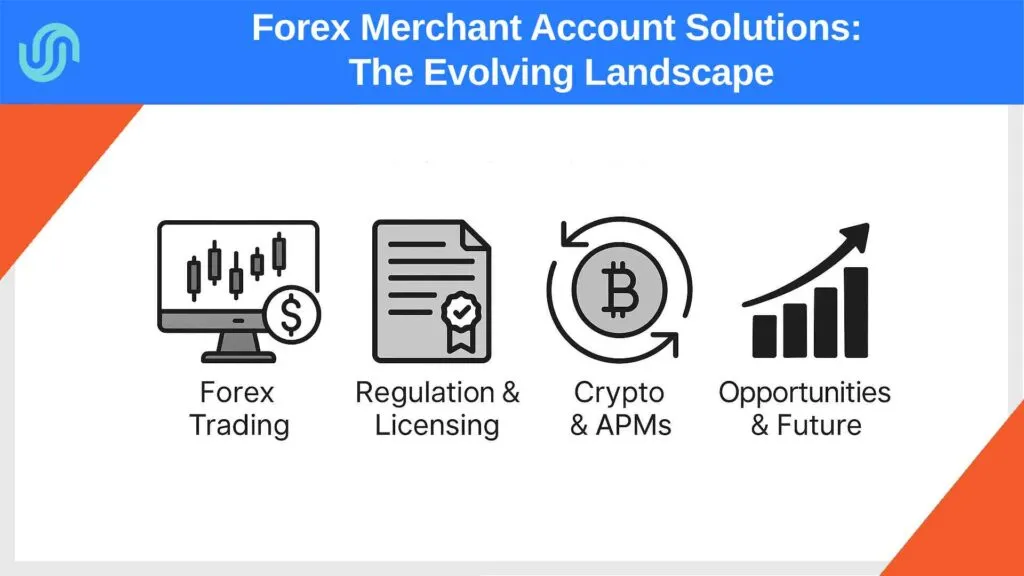Introduction
Forex trading has long attracted entrepreneurs, investors, and risk-takers alike. It offered the promise of global profits, 24/7 markets, and rapid scalability. But in 2026, the landscape is not what it used to be. Regulators are closing in, traditional PSPs are cautious, and consumer protection rules are tighter than ever. Still, for those who adapt, the opportunities remain vast. In this article, we explore how the Forex industry is evolving, where binary options have gone, how brokers manage payments, what the future holds for high-risk financial services and how to get forex merchant account.
Current State: Decline, Diversification, or Evolution?
The traditional model of Forex brokerage has seen declining popularity, especially in tightly regulated regions like the EU, UK, and Australia. Binary options have largely disappeared from licensed markets, labeled as deceptive or predatory by regulators. For example, ESMA and the FCA have banned binary options for retail clients. Yet, some offshore platforms continue to operate under minimal oversight.
However, this does not mean the industry has vanished. Instead, it is shifting:
- Emerging Markets: Southeast Asia, LATAM, and parts of Africa are becoming new hubs.
- Crypto Integration: Many Forex brokers now offer crypto CFD trading or accept crypto deposits.
- Hybrid Models: New platforms blend Forex with social trading, AI-based analysis, or even prop trading models.
Some of the most prominent Forex platforms still active today include:
- IG Group – FCA-regulated and among the oldest, with operations in multiple regions.
- XM – Cyprus-based broker with global reach and extensive education tools.
- Exness – Known for high leverage and operations in Asia, Africa, and the Middle East.
Regulation and Licensing by Region
| Region | Regulatory Status | Key Authorities |
|---|---|---|
| European Union | Heavily regulated under MiFID II and ESMA | CySEC (Cyprus), BaFin |
| United Kingdom | FCA imposes capital requirements, leverage limits | FCA |
| Australia | Tighter rules since 2021 on leverage and promotion | ASIC |
| UAE | Limited licenses, strict KYC and capital rules | DFSA, ADGM |
| Africa & LATAM | Fragmented and less mature, often unregulated | FSCA (South Africa), CNBV |
| Offshore | Easy entry, low trust among banks and PSPs | VFSC (Vanuatu), FSA (Seychelles), AOFA (Anjouan) |
Payment Methods in the Modern Forex Industry
Due to restrictions from acquiring banks and card schemes, Forex brokers often operate with:
- Cryptocurrency payments – fast, anonymous, and increasingly preferred by offshore entities.
- Alternative Payment Methods (APMs) – PIX (Brazil), UPI (India), M-Pesa (Africa).
- Third-party processors – including high-risk PSPs and EMI providers in jurisdictions like Lithuania, Georgia, or Kazakhstan.
- Aggregator models – similar to iGaming, where payments are processed under shared MIDs.
Comparison with iGaming
| Factor | Forex | iGaming |
| Risk perception by PSPs | Very high | High but more predictable |
| Regulation framework | Often gray or offshore | Clearer licenses (MGA, Curacao, UKGC) |
| Crypto integration | Widely used | Common, but often secondary |
| Acquisition interest | Low interest from traditional banks | Moderate interest under licenses |
Opportunities and Future Prospects
While traditional Forex is no longer the gold rush it once was, several models are emerging that attract both entrepreneurs and investors:
1. Prop Trading Firms
Prop trading (proprietary trading) firms such as FTMO provide traders with simulated capital. Traders pay for evaluation challenges and keep a profit share if they pass. This model avoids direct investment handling and bypasses regulation hurdles. (note: some operators have faced regulatory actions in recent years, raising compliance expectations).
Benefits:
- No need for licensing in most jurisdictions
- Scalable SaaS-style business
- High margin from challenge fees
2. Copy Trading & Social Platforms
Platforms like ZuluTrade or eToro allow traders to copy positions of top-performing traders. Forex firms integrating such features see better retention and engagement.
Benefits:
- Less risk for new traders
- Built-in virality and community effect
3. Education & Trading Tools
Some ex-brokers pivot to providing courses, AI analysis tools, or signal services. Examples include TradingView integrations, mobile apps with gamified education, and white-label platforms.
Benefits:
- Lower compliance burden
- B2C or B2B monetization
4. Crypto-Centric Brokerages
Firms blending Forex with DeFi or CeFi ecosystems now provide tokenized assets, staking features, or on-chain analytics.
Example: PrimeXBT has added synthetic Forex assets tradable via crypto wallets.
Payments in 2026: What Acquirers Care About
In 2026, acquirers underwriting Forex/CFD and prop trading brands are less focused on “promised volumes” and far more focused on operational proof: how you acquire traffic, how you control fraud, and how you prevent chargebacks. Expect deeper questions during onboarding, plus tighter monitoring after go-live.
1) Traffic quality and acquisition transparency
Acquirers want a clear map of how you get customers: SEO, affiliates, paid social/search, influencers, email, or media buying. You should be ready to disclose top channels, top geos, publisher/affiliate terms, and provide examples of creatives and landing pages. Any mismatch between “declared marketing” and “actual flows” is a red flag.
2) Strong KYC/KYB, plus ongoing monitoring
It’s no longer enough to “collect documents.” Acquirers look for layered identity checks, clear customer risk scoring, device/geo consistency checks, and ongoing monitoring of suspicious patterns—especially for cross-border activity. For B2B flows (introducers, affiliates, IBs), KYB and contract governance is scrutinized too.
3) Chargeback prevention as a system, not a slogan
You’ll be asked for a written chargeback strategy: clear refund policy, cancellation workflow, customer support SLAs, complaint handling, and evidence that disputes are addressed early. Acquirers also care about descriptor clarity, “no surprises” billing, and friction controls (3DS rules, velocity limits, BIN/country filters). If you run subscriptions, demonstrate robust renewal notifications and easy cancellation.
4) Refund logic, payouts, and consumer-fairness controls
Refund speed and logic matter. Acquirers increasingly test whether refunds are processed within stated timelines and whether the brand has a consistent approach to partial refunds, goodwill refunds, and chargeback escalations. For Forex/CFD offers, they may also require clearer risk disclosures and stricter onboarding for vulnerable segments.
5) Geo strategy and compliance boundaries
Many risk decisions in 2026 are geo-driven. Be ready to explain where you accept customers, where you do not accept customers, and how you enforce those boundaries (IP rules, document checks, payment instrument checks, and block lists). “We accept worldwide” often triggers deeper scrutiny.
6) Payment mix that reduces disputes, not just boosts conversion
Cards still matter, but acquirers increasingly like a diversified mix (cards + local APMs + bank transfer rails). The goal is stability: fewer disputes, cleaner settlement, and better customer expectations. If you use crypto rails, acquirers will look for strong source-of-funds logic, KYT controls, and a clear consumer refund approach.
7) Operational resilience and post-go-live monitoring
Acquirers care about what happens after approval: monitoring dashboards, alerting, incident response, and the ability to quickly pause risky traffic sources or geos. Demonstrating measurable KPIs—approval rate, fraud rate, chargeback ratio, refund rate, and complaint rate—helps you keep processing stable during scaling.
Practical tip: If you can document the above in a short “Risk & Payments Playbook” (2–4 pages) and align your website policies, checkout UX, and support operations to it, underwriting becomes faster—and your MID is more likely to survive the first 60–90 days.
How WiseAlt Supports Forex Businesses and Forex Merchant Account
At WiseAlt, we understand the challenges Forex businesses face and could help with:
- Forex Merchant Account
- Tailored PSP and EMI matching for high-risk Forex models
- Crypto gateway integration
- Jurisdiction consulting and MID structuring
- Multi-currency support and fraud prevention tools
Whether you’re a licensed broker, launching a prop firm, or building a hybrid model, we help navigate payment complexities and global compliance.


